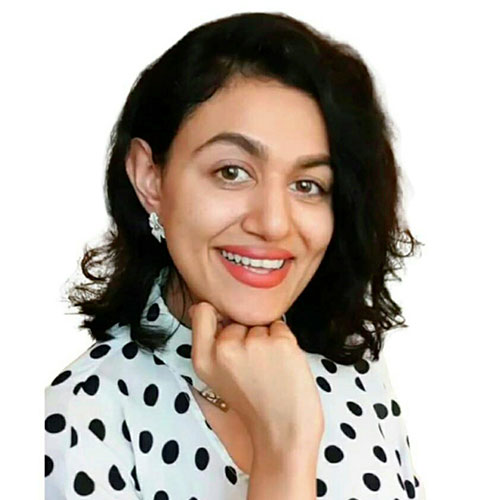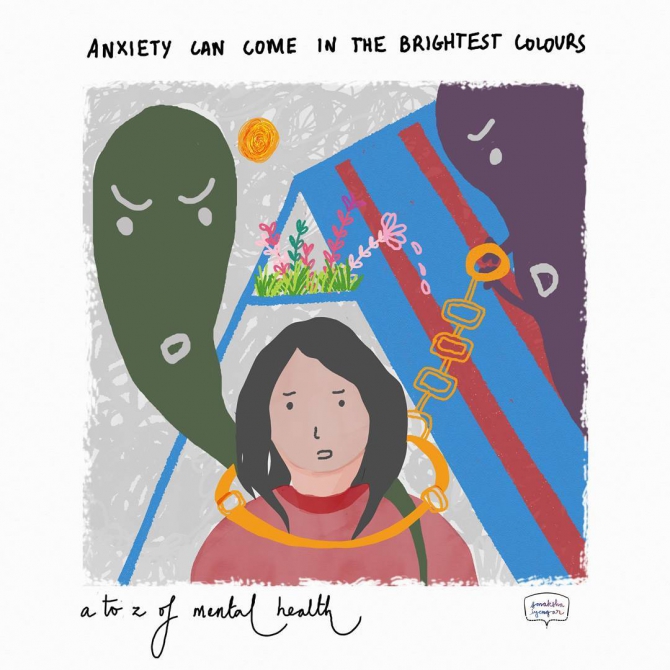Being constantly bombarded with news of Covid-19 cases, ever-changing SOPs, and a variety of other sociopolitical issues in a post-pandemic, social media savvy era all amount to increased risks of mental health issues. While depression is one of the most common mental illnesses that has spiked in recent years, anxiety disorders are of equal concern—affecting how individuals respond to different stressful situations in life.
To learn more about anxiety and how to cope with it, we speak to Shireen Olikh, a licensed clinical psychologist, former beauty queen, mental health advocate, and founder of Illuminated Therapy—a global teletherapy company based in Kuala Lumpur.


BURO: In psychological terms, what is anxiety?
Anxiety refers to racing thoughts about fears and worries, that are commonly associated with muscle tension, and avoidance behaviour. Simply put, anxiety is basically the anticipation of a future concern, that leaves you feeling terrible.
BURO: How prevalent is anxiety today, especially after the Covid-19 pandemic hit?
According to the World Health Organisation (as of 2021), 3.6 per cent—approximately 264 million individuals worldwide—have an anxiety disorder. We need to take this seriously because essentially this invisible illness is taking over the world.

BURO: What are the major forms of anxiety and what are the symptoms to look out for?
The major forms of anxiety that I normally treat clients for would be:
Generalised anxiety disorder
This is when a person experiences excessive worry about their abilities to carry out daily tasks. The worries may include job responsibilities, personal health, family matters, car maintenance, or appointments. The main symptoms to look out for would be:
- restlessness
- irritability
- feeling tired easily
- difficulty concentrating
- body aches
- sleeping troubles
The next time someone is snappy with you, before you jump to the conclusion that they’re a complete jerk, maybe take some time to factor in that they might just have anxiety.
Panic disorder
What sets this apart is the recurrent panic attacks that cause an overwhelming amount of psychological and physical distress. Symptoms of a panic attack can get so severe that people experiencing it may think they’re having a heart attack. Why do panic attacks occur? It could be due to encountering a feared event, but it may also occur for no apparent reason. The symptoms consist of:
- chest pain
- feeling dizzy
- rapid heart rate
- shortness of breath
- hot or cold flashes
- numbness or tingling
Social anxiety disorder
View this post on Instagram
A person experiencing this would have significant worries about being embarrassed, humiliated, or rejected in social interactions. Think along the lines of an extreme fear of public speaking, meeting new people, or dining out in public. Generally people with social anxiety disorder try to avoid social situations, or if they have to engage in them, they endure it with great levels of anxiety. Symptoms are similar to those mentioned above:
- racing heart
- muscle tension
- nausea
- dizziness
- replaying social interactions after they have happened*
- intense fear of embarrassing oneself*
- avoiding social interactions*
*major symptoms
Obsessive-compulsive disorder (OCD)
OCD tends to develop in more severe cases of anxiety. It revolves around a person having obsessive thoughts and engaging in compulsive behaviours to reduce the level of anxiety that the person is experiencing. It isn’t just about nail biting—think more along the lines of washing your hands seven times, or even viewing certain colours as “good” or “bad”. A key distinction is that these obsessive thoughts, and compulsive behaviours, tend to interfere with your life—work, social life, or other areas. Symptoms include:
- persistent checking (i.e., locks, light switches, oven)
- contamination fears (i.e., feeling the need to continuously clean due to an intense fear that things are dirty)
- hyper-focused on things being lined up a certain way
BURO: How are anxiety disorders different from feelings of stress, nervousness, anxiousness, worry, or fear?
It’s normal for us to experience stress, nervousness, anxiousness, worry or fear at any point in our lives. After all, we are humans, and haven’t quite reached the level of Siri and Alexa in terms of interacting with others without being affected ourselves. The key distinction is that for an anxiety disorder to be diagnosed, the symptoms must last for at least six months, and they cause a significant amount of difficulty in your ability to carry out daily tasks (i.e. school, work, home).
View this post on Instagram
BURO: What are the common triggers for anxiety?
If you asked me this prior to 2020, I would have had a different answer, but factoring in the pandemic, right now, just leaving the house is considered a common trigger for anxiety. I myself struggle to hold it together during grocery runs, and have to engage in at least one breathing technique and two different coping skills to keep my anxiety manageable. It makes me wonder if I—a licensed clinical psychologist—is struggling, how exactly is the rest of the population coping?
Apart from this, the main triggers are:
- public speaking
- changes in routine (think along the lines of starting a new job or having a baby—both of these can cause a drastic spike in stress and anxiety)
- financial concerns
- relationship issues
- caffeine (remember: anxiety is all about racing thoughts paired with fears. When you throw in caffeine, you get an energy boost, but so does your anxiety)
BURO: Who is most likely to be affected by anxiety disorders? Any specific demographics in Malaysia?
Anxiety disorders are one of the most common mental health issues experienced worldwide, including Malaysia. Women are twice as likely to be affected by anxiety disorders than men, as this could be due to differences in brain chemistry and hormone fluctuations. Your risk of developing an anxiety disorder increases if you have substance abuse issues, experienced trauma, high stress levels, and family members with a mental health disorder.
Factoring in the pandemic, those with low socioeconomic status is associated with a greater risk of developing anxiety disorders. Please note, anxiety isn’t just an “adult issue”—it can affect those from age five to over 60 years old.
BURO: What are the treatments for anxiety?
There are options ranging from medication to psychotherapy (i.e. talk therapy). Medication would only be required in more severe cases. Looking at talk therapy, what you can expect is cognitive behavioural therapy (CBT) which is the most effective form of psychotherapy for anxiety disorders. It’s a short-term treatment that focuses on teaching you coping skills to manage your symptoms and rewire core beliefs.
BURO: Is there a cure for anxiety, especially if the trigger(s) are gone/dealt with?
Anxiety disorders are highly treatable, and yes, they can be cured in the sense that a person experiencing distressing levels of anxiety may one day experience mild to normal levels of anxiety (remember: anxiety is an emotion. We can’t say that we will never experience anxiety because we can’t control our emotions—after all, they are automatic).
I’d like to highlight the following: anxiety disorders can only be cured if a person diagnosed with it consistently applies the coping skills learnt via therapy. The motto I pass on to my clients: nothing will change if you change nothing.
BURO: Do you have any tips for those who struggle with anxiety to cope with their symptoms?
Don’t give up. During 2020, my anxiety levels were so severe that I switched off my handphone for a month, and communicated with people only via emails. The thought of interacting with people terrified me, and I would have laughed if you told me that in less than a year, I would be running webinars and hosting mental health talks for up to 300 people.
This is what helped me challenge anxiety and keep it at bay, and I hope it helps you too. When you have a thought, get into the habit of asking yourself:
- Do I have evidence for this? (The type that would uphold in court)
- Is my thought based on facts, or feelings? (Feelings are not facts. Feelings make us feel that what we are experiencing is true, even though it’s simply a thought that doesn’t exist in the present moment)
- Is my thought a worst-case scenario? (Any time you answer “yes” to this, use it as an immediate “anxiety cheat-sheet” question. Worst-case scenario thoughts = anxiety)
Another technique is called the 3-3-3. It’s simple: name three things you can see, three things you can feel, and three things you can hear. This helps you to ground yourself in the present moment, instead of being swept away by anxious thoughts (I refer to these as the invisible monsters in the mind—for those experiencing anxiety, you know exactly what I mean).
BURO: What should family members/friends/caregivers be aware of when dealing with a loved one who struggles with anxiety?
Be patient with them. Please don’t tell them to “just think positively”—if they could do that, they already would be doing it. If you notice that your loved one is experiencing persistent fear and worry, it might be a good idea to get them a mental health screening. Think about it like this, you get a yearly physical health check-up, but when was the last time you got a mental health check-up? Mental health is just as important as physical health.
To empower you to prioritise your mental health, Shireen is offering a complimentary 30-minute virtual mental health screening for BURO readers throughout the month of October. To book an appointment, WhatsApp +60111 783 2645. Additionally, readers can use the code BURO21 to be entitled to 60 per cent off therapeutic services.
Alternatively, if you are in need of urgent mental help, do not hesitate to reach out to the following hotlines:
- Malaysian Mental Health Association (MMHA)03 7782 5499
- Talian Kasih Hotline 15999 (24 hours) / 019 261 5999
- Think I Need Aid (TINA)018 988 8058
Read our mental health directory here for more resources on other mental health topics.
| SHARE THE STORY | |
| Explore More |




